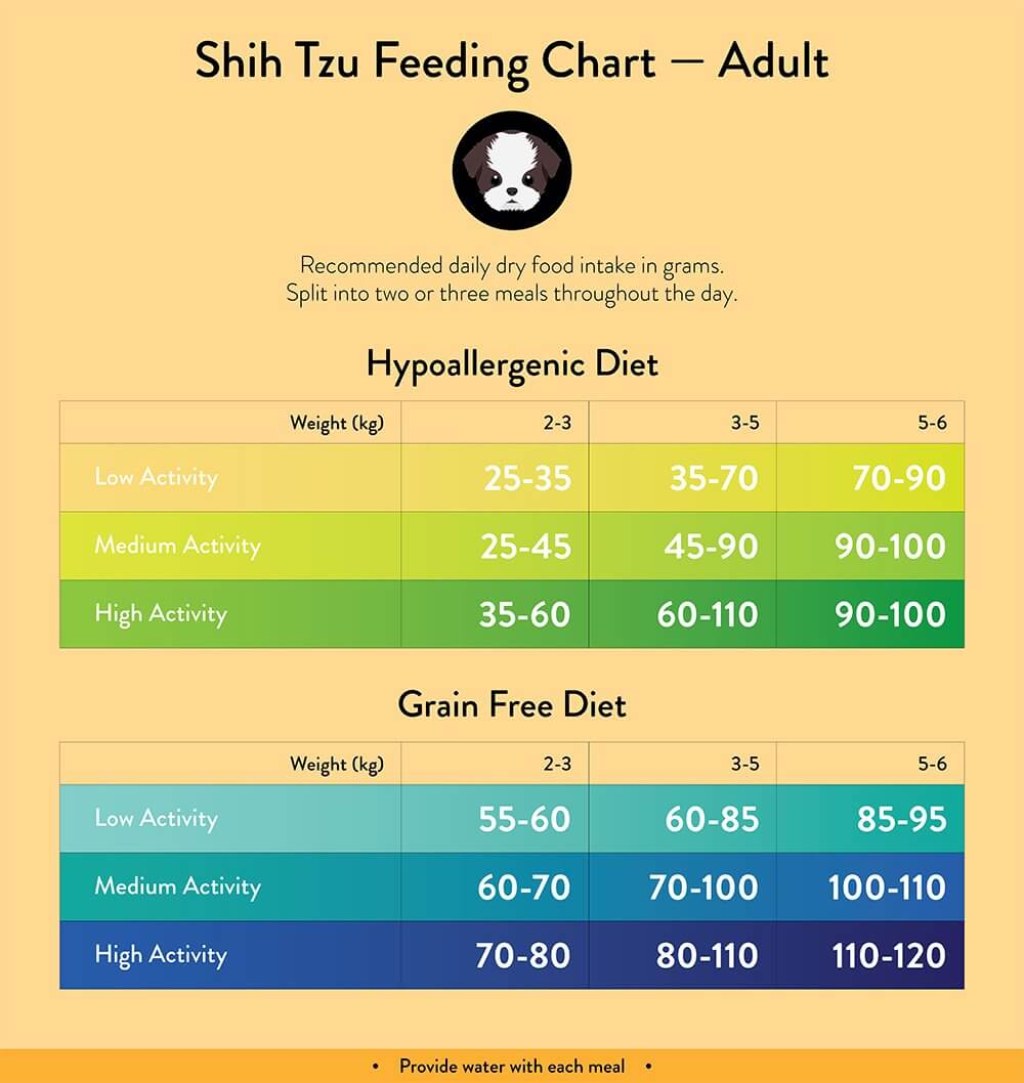Ultimate Shih Tzu Puppies Feeding Guide: Master The Art Of Nourishing Your Furry Babies!
Shih Tzu Puppies Feeding Guide
Introduction
Dear Puppies Lover,
2 Picture Gallery: Ultimate Shih Tzu Puppies Feeding Guide: Master The Art Of Nourishing Your Furry Babies!


Welcome to our comprehensive guide on feeding Shih Tzu puppies. In this article, we will provide you with valuable information to ensure that your adorable Shih Tzu puppies receive the proper nutrition they need for a healthy and happy life.

Image Source: headsupfortails.com
Feeding puppies can be a challenging task, but with the right knowledge and guidance, you can provide them with a balanced diet that caters to their specific needs. By following this feeding guide, you will be able to give your Shih Tzu puppies the best start in life.
Before we dive into the details, it’s important to note that every puppy is unique, and their nutritional requirements may vary. It’s always recommended to consult with a veterinarian for personalized advice based on your puppy’s specific needs.

Image Source: shopify.com
Now, let’s explore the world of Shih Tzu puppies feeding together!
Table of Contents
1. What is a Shih Tzu?
2. Who Should Own a Shih Tzu Puppy?
3. When Should You Start Feeding Your Shih Tzu Puppy?
4. Where Should You Feed Your Shih Tzu Puppy?
5. Why is a Balanced Diet Important for Shih Tzu Puppies?
6. How to Feed Your Shih Tzu Puppy?
7. Advantages and Disadvantages of Different Feeding Methods
8. Frequently Asked Questions (FAQ)
9. Conclusion
10. Final Remarks
1. What is a Shih Tzu?
Shih Tzu is a small breed of dog known for its long, flowing coat and friendly temperament. They are often referred to as lion dogs due to their resemblance to the traditional Chinese guardian lions. Shih Tzu puppies are incredibly cute and make great companions.
When it comes to feeding Shih Tzu puppies, it’s essential to provide them with the right nutrients to support their growth and development. Let’s explore the specifics of their dietary needs.
2. Who Should Own a Shih Tzu Puppy?
Shih Tzu puppies are suitable for various individuals, including families, singles, and seniors. They are known for their affectionate nature and get along well with children and other pets. However, owning a Shih Tzu puppy requires commitment and responsibility to meet their daily care needs, including feeding.
If you are someone who can provide love, care, and attention to a Shih Tzu puppy, then you are the perfect candidate for owning one.
3. When Should You Start Feeding Your Shih Tzu Puppy?
When you bring your Shih Tzu puppy home, the transition from their mother’s milk to solid food begins. It is recommended to start introducing solid food to your puppy around the age of 4 to 6 weeks. However, every puppy is different, so it’s important to observe their readiness to eat solid food.
During the first few weeks, it’s crucial to provide your Shih Tzu puppy with a diet that mimics their mother’s milk. This can be done with the help of specialized puppy milk replacers or moistened puppy food. As they grow, you can gradually transition them to dry kibble.
4. Where Should You Feed Your Shih Tzu Puppy?
Creating a designated feeding area for your Shih Tzu puppy is essential to establish a routine and maintain cleanliness. Choose a quiet and easily accessible spot in your home where your puppy can eat without distractions.
It’s important to note that Shih Tzu puppies should not be fed in elevated bowls, as it can contribute to health issues such as breathing difficulties or digestive problems. Opt for bowls that are at ground level to ensure their comfort while eating.
5. Why is a Balanced Diet Important for Shih Tzu Puppies?
A balanced diet is crucial for the overall health and well-being of Shih Tzu puppies. It provides them with the necessary nutrients, vitamins, and minerals for proper growth and development. A balanced diet also helps maintain their coat’s health, prevent dental issues, and support their immune system.
Feeding your Shih Tzu puppy an unbalanced diet can lead to various health problems, including obesity, allergies, and nutrient deficiencies. It’s important to choose high-quality puppy food that meets their specific nutritional requirements.
6. How to Feed Your Shih Tzu Puppy?
Feeding your Shih Tzu puppy involves more than just filling their bowl with food. It’s essential to establish a feeding schedule, monitor portion sizes, and provide them with the right type of food. Here are some key points to consider when feeding your Shih Tzu puppy:
Establish a feeding schedule: Puppies thrive on routine, so it’s important to feed them at consistent times throughout the day. Divide their daily food portion into multiple meals to avoid overfeeding or causing digestive issues.
Choose the right puppy food: Look for high-quality puppy food that is specifically formulated for small breeds like the Shih Tzu. Read the ingredient list and ensure it contains a good balance of protein, carbohydrates, and fats.
Monitor portion sizes: Overfeeding can lead to obesity, while underfeeding can result in nutrient deficiencies. Follow the feeding guidelines provided on the puppy food packaging and adjust the portion sizes based on your puppy’s age, weight, and activity level.
Provide fresh water: Always make sure your Shih Tzu puppy has access to clean and fresh water. Hydration is crucial for their overall health and digestion.
Avoid table scraps: While it may be tempting to share your food with your puppy, it’s important to avoid feeding them table scraps. Human food can cause digestive issues and may not provide the necessary nutrients for their development.
Monitor their weight: Regularly check your puppy’s weight to ensure they are growing at a healthy rate. If you notice any significant weight gain or loss, consult with a veterinarian.
Gradual transitions: When introducing a new brand or type of food, it’s important to do it gradually. Sudden changes in diet can cause digestive upset. Mix a small amount of the new food with their current food and gradually increase the ratio over a period of 7 to 10 days.
7. Advantages and Disadvantages of Different Feeding Methods
There are various feeding methods available for Shih Tzu puppies, each with its advantages and disadvantages. Let’s explore the pros and cons of different feeding methods:
Free-Choice Feeding
Advantages:
– Allows puppies to eat as much as they want throughout the day.
– Convenient for busy owners who may not be able to stick to a strict feeding schedule.
Disadvantages:
– Can lead to overeating and obesity if portion sizes are not monitored.
– Difficult to track your puppy’s appetite and detect any changes in their eating habits.
Scheduled Meal Feeding
Advantages:
– Allows better control over portion sizes and feeding times.
– Helps establish a routine and prevents overeating.
Disadvantages:
– May require more time and effort from the owner to stick to a strict schedule.
– Puppies may experience hunger between meals, especially during growth spurts.
Mix of Free-Choice and Scheduled Meal Feeding
Advantages:
– Provides a balance between freedom and control.
– Allows puppies to have access to food throughout the day while still having scheduled meals.
Disadvantages:
– Requires careful monitoring of portion sizes and overall calorie intake.
– May not be suitable for puppies with specific dietary needs or weight management issues.
Raw Feeding
Advantages:
– Provides a natural and biologically appropriate diet for puppies.
– Can improve coat and skin health.
Disadvantages:
– Requires extensive knowledge and preparation to ensure a balanced and safe diet.
– Risk of bacterial contamination or nutrient imbalances if not done properly.
Home Cooked Meals
Advantages:
– Allows better control over ingredients and quality of food.
– Can be tailored to meet specific dietary requirements or address allergies.
Disadvantages:
– Requires careful planning and preparation to ensure a balanced diet.
– May be time-consuming and expensive.
Commercial Puppy Food
Advantages:
– Convenient and readily available.
– Specifically formulated to meet the nutritional needs of puppies.
Disadvantages:
– Quality can vary among brands, so it’s important to choose a reputable one.
– Some commercial puppy foods may contain fillers or low-quality ingredients.
8. Frequently Asked Questions (FAQ)
Q: Can I feed my Shih Tzu puppy human food?
A: It’s best to stick to a high-quality puppy food that is specifically formulated for their nutritional needs. Human food can cause digestive issues and may not provide the necessary nutrients for their development.
Q: How many times a day should I feed my Shih Tzu puppy?
A: Puppies should be fed multiple times a day to meet their growing needs. A general guideline is to feed them three to four small meals until they reach six months of age, then transition to two meals a day.
Q: Should I give my Shih Tzu puppy supplements?
A: It’s important to consult with a veterinarian before adding any supplements to your puppy’s diet. In most cases, a balanced and high-quality puppy food should provide them with all the necessary nutrients.
Q: Can I feed my Shih Tzu puppy raw food?
A: Raw feeding can be an option for Shih Tzu puppies, but it requires extensive knowledge and preparation to ensure a balanced and safe diet. Consult with a veterinarian to determine if it’s the right choice for your puppy.
Q: How can I tell if my Shih Tzu puppy is overweight?
A: Regularly monitor your puppy’s weight and body condition. You should be able to feel their ribs with a slight layer of fat covering them. If you notice significant weight gain or difficulty feeling their ribs, consult with a veterinarian for guidance.
9. Conclusion
Feeding your Shih Tzu puppies a balanced and nutritious diet is essential for their overall health and well-being. By following the guidelines provided in this feeding guide, you can ensure that your puppies receive the necessary nutrients for proper growth and development.
Remember to establish a feeding schedule, monitor portion sizes, and choose high-quality puppy food that meets their specific nutritional needs. Additionally, consult with a veterinarian for personalized advice based on your puppy’s unique requirements.
With the right nutrition and care, your Shih Tzu puppies will grow into healthy and happy companions for years to come.
10. Final Remarks
Dear Puppies Lover,
We hope you found this comprehensive guide on Shih Tzu puppies feeding helpful and informative. Remember, providing your puppies with a balanced diet is crucial for their overall health and well-being.
If you have any further questions or concerns about feeding your Shih Tzu puppies, we strongly recommend consulting with a veterinarian. They can offer personalized advice based on your puppy’s specific needs and help you make the best decisions for their nutrition.
Wishing you and your Shih Tzu puppies a lifetime of happiness and good health!
This post topic: Puppies



